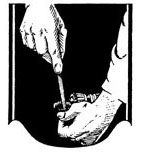
Should Christians Pay Reparations for Racial Injustices?
REVERT'S ROSTRUM
While a student at the University of Virginia, I had many arresting and confusing moments trying to understand the black experience in America. I once witnessed several eight- and nine-year-old black children, whom I knew personally from an inner-city tutoring program, loudly curse at and harass a white police officer driving through their neighborhood. Another time I called the home of a black student-athlete at Charlottesville High School whom I coached and mentored, only to learn from his grandmother that he had abruptly decided to move to Georgia to live with his unemployed and seemingly uninterested mother. Then there was the frequency with which it was difficult even to get a hold of black kids I tutored or coached — their phones, I learned, were often disconnected for failing to pay the bill.
I suppose the biggest lesson from such incidents was that for a middle-class white kid like myself, I had a lot to learn about the lives and challenges low-income black Americans face. I wanted to help, but the more time I invested, the more I realized that the problems they face are complex, multigenerational, and, perhaps in some circumstances, even traceable to our nation’s very origins. Understanding that story, and what Christians should do about it, is the objective of Presbyterian pastors Duke L. Kwon and Gregory Thompson’s new book, Reparations: A Christian Call for Repentance and Repair.
Kwon (who is Asian) and Thompson (who is white) argue that American society has been and remains white supremacist, meaning that our social and cultural structure is essentially ordered to the dominance of one race over others. They claim that the most salient effect of white supremacy is theft, whereby the “identities, agency, and prosperity of African Americans are systematically stolen and given to others.” Moreover, American Christians have been complicit in this terrible, historical campaign, and, by virtue of their religion’s sense of justice and its evangelistic and redemptive mission, they bear some responsibility for redressing these wrongs. Christians are called, the authors believe, to repair the legacy of white supremacy through restitution (returning stolen wealth) and restoration (restoring the wronged to wholeness).
NOR readers might wonder what relevance this has for Catholics, given that (1) the authors, and presumably their intended audience, are Protestants; and (2) the Catholic Church’s role in American society has often been one not of victimizer, but, like many black Americans, victim. A recent news story addresses both questions. In October 2019 Georgetown University announced plans to offer reparations to the descendants of the 272 slaves the Jesuit-run school sold in 1838 to pay its debts. Georgetown isn’t unique. Many American Catholics benefited from slavery. Though Pope Gregory XVI condemned the institution in his papal bull In Supremo (1839), American bishops refrained from pressing Catholic slave-owners to free the thousands of blacks in their possession. To put it bluntly, the Catholic Church in America was often complicit in the perpetuation of human bondage.
You May Also Enjoy
The missionaries' love enabled them to long for martyrdom for the salvation of souls.
The Cyrenian approach to debt relief is personal: he lends a debtor money out of his own pocket at an unbeatable interest rate — nothing.
Free enterprise in its earlier stage was the unwitting and ungrateful beneficiary of generations of hardworking, God-fearing people.

